What is OpenVPN Protocol and How Does It Ensure Online Privacy?
You may have bumped into this term when searching for a VPN app for your needs. But if you’re more into virtual private networks, you probably know that OpenVPN is not exactly a VPN service (although it does have a client app). Instead, it’s one of the most powerful and stable VPN protocols. But what does OpenVPN do, and should you use it? To answer these questions, we must dive a bit deeper into some tech details. Keep reading to learn all you should know about OpenVPN, explained in simple terms.
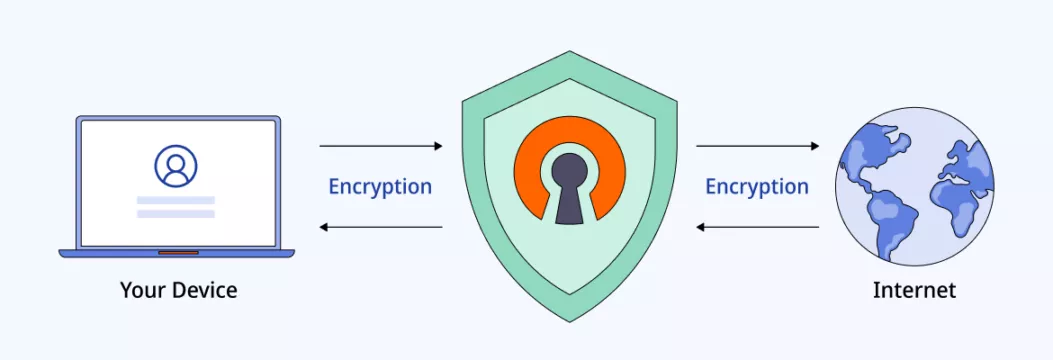
What is OpenVPN and how does it work?
Let’s get started with the OpenVPN definition (or rather definitions, as this term refers to two different solutions).
OpenVPN is a VPN protocol that establishes rules and methods for determining your VPN connection. Just like other protocols, it’s responsible for the way your traffic moves through the VPN tunnel, including data encryption, security, stability, and speed.
OpenVPN was introduced back in 2001 and released a year later. Today, it’s one of the most common, reliable, and popular protocols. Unsurprisingly, nearly every reputable VPN service provider offers it among the options available to users. One of the main advantages of OpenVPN is its transparency due to the open-source nature of its code (we will tell you more about this and other benefits later on).
At the same time, OpenVPN also refers to an application that allows users to connect to VPN servers of different service providers and set up their own VPN networks. This software is available for Windows, macOS, Linux, Android, and iOS operating systems.
Now, let’s figure out how OpenVPN works – both as a protocol and as an application.
How does OpenVPN work?
As mentioned above, OpenVPN protocol is responsible for secure and stable data transmission, while the app provides access to VPN servers for users. First, let’s explore what the protocol does.
OpenVPN protocol
OpenVPN handles multiple processes when your data travels through a VPN tunnel. Here are its main functions:
- Encryption
One of the main perks of every VPN service is data encryption. This process ensures your privacy on the web by transforming your personal information into a gibberish text nobody can read before it’s decrypted with a specific key. As a result, when you’re connected to a VPN server, snoopers, hackers, and other actors cannot see what you’re up to.
To ensure robust encryption, OpenVPN uses the OpenSSL library, which is considered one of the most advanced to date. It uses various ciphers (sets of characters, symbols, and numbers), including AES-256-bit encryption – the golden standard for modern VPN services. It changes your messages and search requests 14 times before it reaches the destination, making your data nearly impossible to crack.
- Secure connection
OpenVPN does even more to protect users’ traffic from online threats. Instead of using a standard set of solutions, it offers a unique security protocol that combines Transport Layer Security (TLS) and Secure Sockets Layer (SSL) capabilities. However, these extra security layers may affect your Internet connection. The thing is that so many functions require longer code lines (around 70,000, to be more specific), which results in slower speeds and performance challenges.
- Data transportation
If you’re a VeePN user, you may have noticed that there are two different versions of OpenVPN you can select in our client app: OpenVPN UDP and OpenVPN TCP. So what’s the difference? They generally do the same thing, but they transfer your data differently.
OpenVPN User Datagram Protocol (UDP) is more direct (and a bit faster) as it transfers data from your device to the server without extra confirmation requests. In contrast, OpenVPN Transmission Control Protocol (TCP) requires additional approval before sending your data to the web (which slightly slows down your connection speed but is ultimately secure).
Now, a few words about the OpenVPN app.
OpenVPN application
The OpenVPN app aims to help users connect to VPN servers and maintain their connections. It also includes several standard VPN security features like Kill Switch and IP leakage protection. Still, this solution comes with particular drawbacks. More specifically, the OpenVPN app doesn’t offer a full set of features available with top-rated VPN services like VeePN. Besides, its interface is not as convenient and straightforward as you would expect from a VPN client.
Now, let’s get back to the OpenVPN protocol and determine whether you should use it by comparing its most significant pros and cons.
OpenVPN pros and cons
Here are the advantages of OpenVPN and its downsides to watch out for.
Benefits of OpenVPN:
- Enhanced security. OpenVPN supports all advanced encryption standards and provides an extra security layer by combining the capabilities of TLS and SSL protocols. Thus, using OpenVPN is safe.
- Reliability. Your VPN connection is unlikely to fail with OpenVPN, which makes it an effective solution against censorship techniques, like firewalls and Deep Packet Inspection (DPI).
- Transparency. As mentioned above, OpenVPN is an open-source project. It means that third-party developers can look at its code, help detect potential vulnerabilities, and make sure there are no backdoors for compromising users’ privacy.
OpenVPN disadvantages:
- Slower speeds. Due to many security features and lengthy code, OpenVPN is somewhat slower than other modern protocols like WireGuard® and IKEv2/IPsec.
- Challenging setup. The versatility of OpenVPN’s code makes it difficult to set up for those who lack appropriate tech expertise. But if you’re using OpenVPN as one of the available protocols in your VPN app, it won’t be an issue for you to deal with.
With these benefits and potential downsides in mind, let’s find out when OpenVPN is the best bet for your particular goals.
What is OpenVPN used for
Thanks to its top-grade security and robust encryption, OpenVPN perfectly covers the following purposes:
- To perform a secure money transaction (or to trade crypto)
- To overcome advanced censorship blocks and access geo-limited content
- To set up a VPN on a Wi-Fi router
- To communicate sensitive or confidential information on the web
OK, apparently, OpenVPN rocks – but as you see, it’s not perfect due to potential slowdowns and performance issues. So, are other VPN protocols any better?
OpenVPN vs. other protocols: which is better?
First of all, it’s important to note that there is no one-size-fits-all VPN protocol. Just like OpenVPN, other solutions have their pros and cons and may not be suitable for all possible needs. That is why good VPN services offer several protocols to choose from. VeePN provides the three best options to date – OpenVPN, IKEv2/IPSec, and WireGuard®.
Let’s compare them in more detail to help you find a perfect fit. We will also compare OpenVPN to some other protocols VeePN doesn’t offer (you will soon understand why).
OpenVPN vs. IKEv2 IPsec
IKEv2/IPsec combines two powerful VPN protocols – Internet Key Exchange version 2 (IKEv2) and Internet Protocol Security (IPsec). Unlike OpenVPN, it has a beneficial automatic reconnection feature that safeguards you from sudden VPN connection drops. Also, IKEv2/IPsec is faster than OpenVPN since its code is shorter, and it doesn’t involve so much extra functionality. Finally, both protocols are highly secure and reliable (but in this regard, OpenVPN slightly outperforms its alternatives).
OpenVPN vs. WireGuard®
WireGuard® is one of the most modern VPN protocols. Its main advantage is robust speed and improved performance, making WireGuard® the fastest solution (even compared to IKEv2/IPsec). The only problem is that the technology behind this protocol is relatively new and not time-tested. So for now, it’s not as secure as OpenVPN.
OpenVPN vs. PPTP
PPTP (Point-to-Point Tunneling Protocol) is the oldest VPN protocol, introduced back in 1999. And, well, that’s its main problem. While OpenVPN and other modern protocols apply the 256-bit encryption standard, PPTP supports only 128 bits. It’s normally not enough to protect sensitive information on the web. The only advantage of PPTP over OpenVPN is its speed. But it doesn’t outweigh the security risks it poses. So, unsurprisingly, most VPN services, including VeePN, no longer support the PPTP protocol.
OpenVPN vs. L2TP
Just like IKEv2, L2TP (Layer 2 tunneling protocol) is empowered with IPsec protocol. It’s a relatively stable and secure solution. However, unlike OpenVPN, L2TP is not an open-source project. In fact, it cooperates with the National Security Agency (NSA) and potentially compromises users’ privacy. Besides, L2TP is slower than OpenVPN, and it’s not an effective solution against firewalls.
OpenVPN vs. SSTP
SSTP (Secure Socket Tunneling Protocol) is a Microsoft-based VPN protocol, which means it’s a bit more suitable for Windows users (it also has a version supporting macOS, though). In general, this protocol is quite reliable, secure, and efficient. But unlike OpenVPN, it’s not an entirely privacy-focused solution since it also works with NSA.
OpenVPN vs. IKEv2 vs. WireGuard®. The round-up
Now, let’s sum up the comparison of the three VPN protocols you can use with VeePN. Note that we don’t consider other solutions like PPTP, L2TP, and SSTP since they are not even close to OpenVPN, IKEv2/IPsec, and WireGuard® in terms of security and reliability, so we don’t support them.
| OpenVPN | IKEv2/IPsec | WireGuard® | |
| Security | Very strong | Very strong | Strong |
| Encryption | AES-256 | AES-256 | AES-256 |
| Stability | High | Very high | Very high |
| Speed | Average | Fast | Very fast |
| Best uses | Router setup Secure communication Money transactions Overcoming firewalls | Switching from Wi-Fi to mobile data Streaming media | Online gaming Streaming media |
Any of the mentioned VPN protocols may be a good choice. It all depends on your individual goals and preferences. Now, let’s see how to set up OpenVPN with VeePN in a few easy steps.
How to use OpenVPN protocol
- Choose the pricing plan that works best for you and sign up for VeePN.
- Download and install the VeePN app on your device, whether iOS, Android, Windows, macOS, and Linux.
- Open your VPN app and go to Settings.
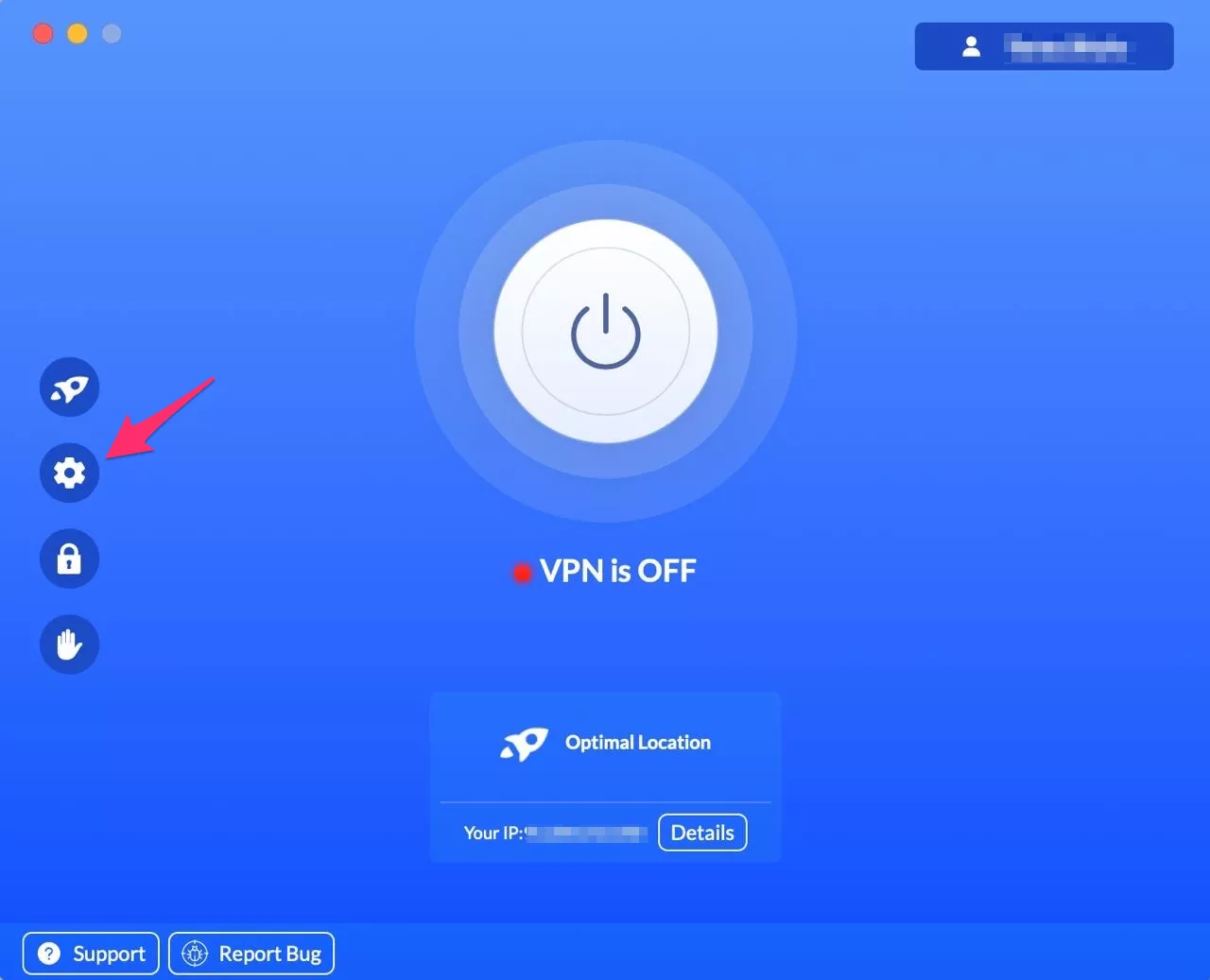
- Select Choose preferred protocol dropdown.
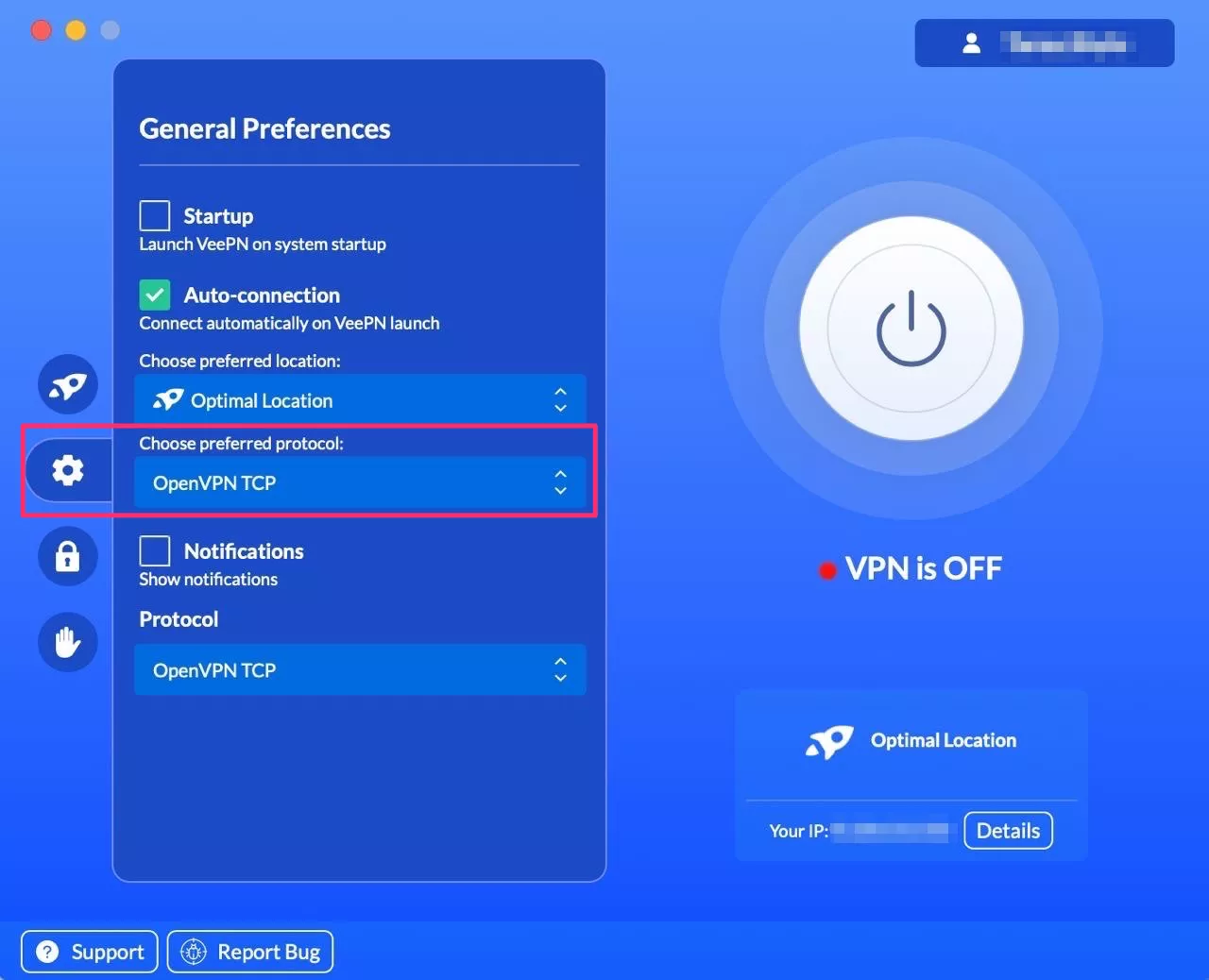
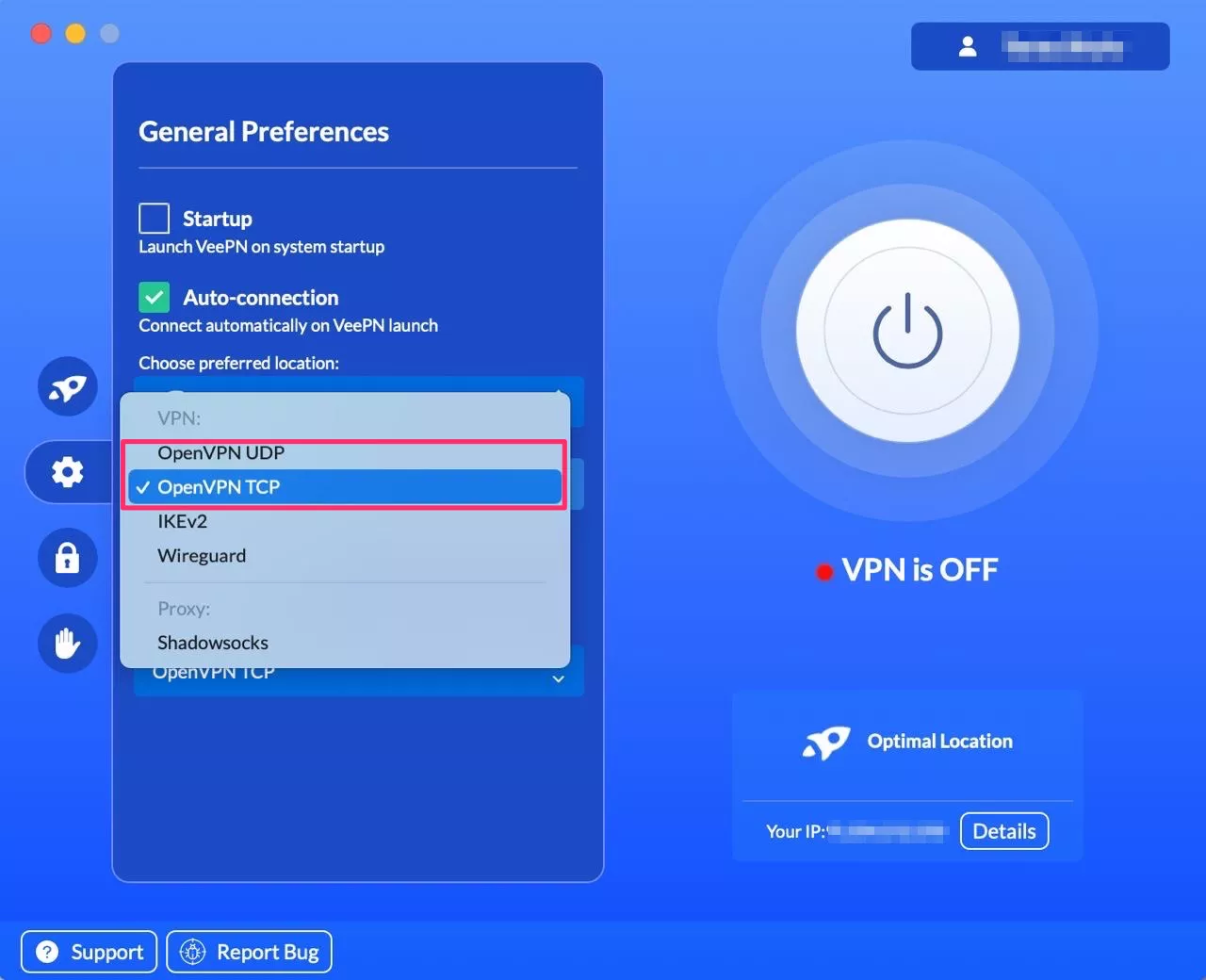
- Select the most suitable server location and turn your VPN on.
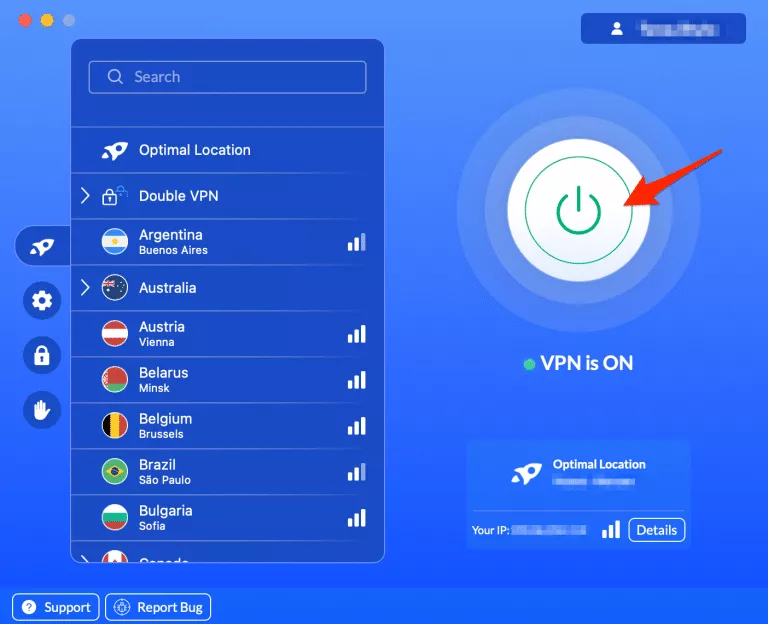
- Enjoy your safe and private browsing experience.
Access powerful VPN protocols like OpenVPN with VeePN
Looking for a credible VPN service that allows you to use OpenVPN and other top-rated protocols? Try VeePN! Apart from the opportunity to choose from OpenVPN, IKEv2/IPsec, and WireGuard®, it also enhances your Internet privacy and security thanks to ultimate AES-256 encryption and multiple powerful features, including NetGuard, Kill Switch, and Double VPN. VeePN will help you keep yourself away from online threats and make your digital footprint nearly untraceable.
Try VeePN now and safeguard yourself with a 30-day money-back guarantee!
FAQ: What Is OpenVPN?
If you’re using the OpenVPN app, head to Status > OpenVPN to check if it’s working properly. It will display the current status (connected, waiting, reconnecting, or else). In turn, if you’re using OpenVPN as a protocol in your VPN application like VeePN, you can be sure it’s working when it’s enabled in your app’s settings.
No, OpenVPN uses the OpenSSL library and combines TLS and SSL protocols to ensure secure and stable data transfer. The IPsec protocol is included in IKEv2 and L2TP.
A VPN (virtual private network) is a service that enhances users’ privacy and safety online by encrypting their data and rerouting it through a remote access server. You can download a dedicated VPN client app to access its security features and multiple servers in various locations. In contrast, OpenVPN is a VPN protocol that establishes a secure and stable connection in the encrypted tunnel. For example, with VeePN, you can choose between OpenVPN, IKEv2/IPsec, and WireGuard® protocols depending on your needs. Read this article to learn more.
The OpenVPN app is free for all devices and platforms, including Windows, macOS, Linux, iOS, and Android. However, if you seek robust security, stability, and connection speed, it’s worth choosing a trustworthy paid VPN provider like VeePN, which also has OpenVPN access server among the available protocols. For more information, read this article.
Yes, OpenVPN is a highly secure VPN protocol. It uses multiple encryption standards, including AES-256 – the most advanced solution to date. Besides, OpenVPN protects your data with many additional security protocols, including TLS and SSL. For more details on secure access to the Internet, check out this article.
VeePN is freedom
Download VeePN Client for All Platforms
Enjoy a smooth VPN experience anywhere, anytime. No matter the device you have — phone or laptop, tablet or router — VeePN’s next-gen data protection and ultra-fast speeds will cover all of them.
Download for PC Download for Mac IOS and Android App
IOS and Android App
Want secure browsing while reading this?
See the difference for yourself - Try VeePN PRO for 3-days for $1, no risk, no pressure.
Start My $1 TrialThen VeePN PRO 1-year plan






